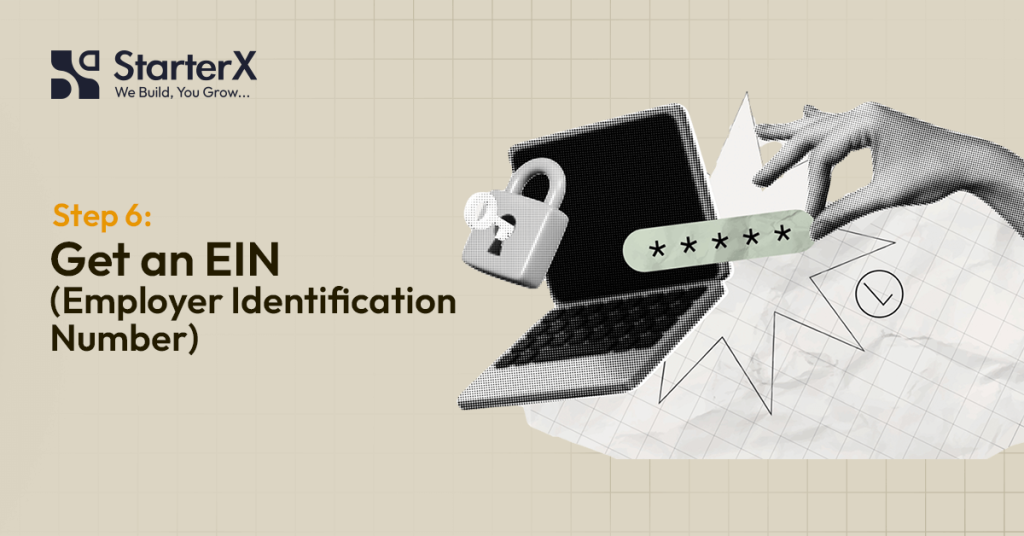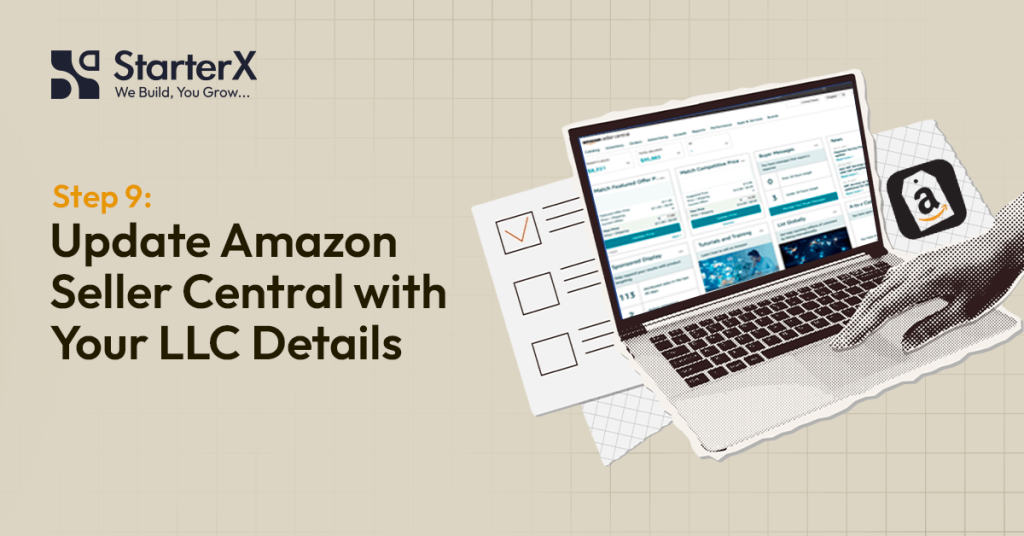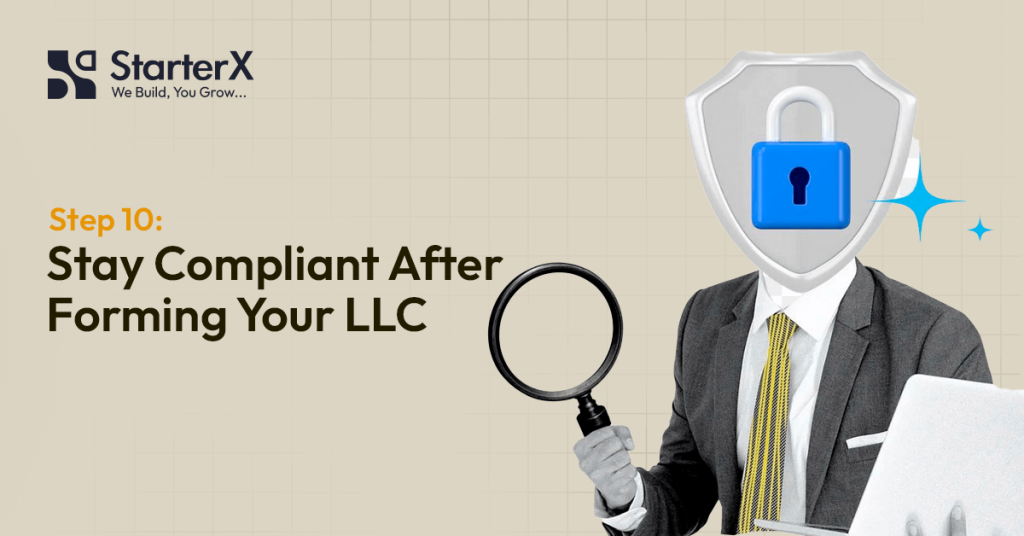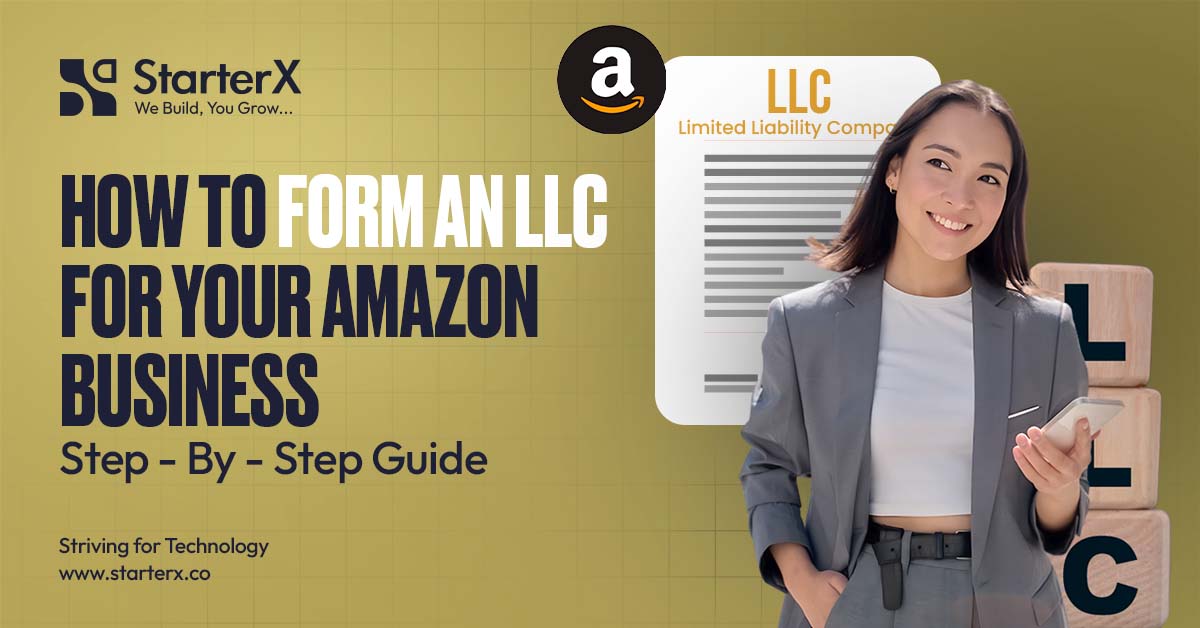If you are asking how to form an LLC for your Amazon business, here is the simple answer:
Choose a state, pick a business name, appoint a registered agent, file your Articles of Organization, create an Operating Agreement, apply for an EIN with the IRS, open a business bank account, and update your Amazon Seller Central with your LLC details.
The main reason sellers form an LLC is protection. An LLC separates your personal money from your business. If something goes wrong with your Amazon store, such as a product issue or a legal claim, your personal assets, like your house and savings, remain safe.
An LLC also builds credibility. Suppliers, banks, and Amazon itself trust registered businesses more than individuals. This makes it easier to secure partnerships, access credit, and even sell your Amazon brand in the future.
The process and cost of forming an LLC depend on your state. Sellers in Texas, California, Florida, and New York face different fees compared to those forming in Delaware or Wyoming. If you are an international seller from the UAE, Canada, or other countries, forming a U.S. LLC also helps with payments, banking, and tax compliance.
In this guide, you’ll find a step-by-step breakdown of the entire process with practical details that Amazon sellers actually need, no filler, just clear actions.
Table of Contents
ToggleStep 1: Decide Where to Form Your LLC

The best state to form your Amazon LLC is usually your home state, unless you have specific reasons to register in Delaware, Wyoming, or Nevada.
Choosing the right state matters because it affects your filing fees, annual taxes, and compliance requirements. Most Amazon sellers are better off forming in the state where they live and operate, since registering elsewhere often triggers the need for a “foreign LLC” filing in their home state, which means double costs.
Let’s look at the key options.
Forming an LLC in Your Home State
- Best choice for most sellers because compliance and tax reporting are handled in one place.
- Avoids the need for foreign LLC registration.
- Makes banking and licensing straightforward since documents are issued locally.
For example:
- Texas: No state income tax. Franchise tax only applies if revenue exceeds $2.47 million (2025 threshold).
- California: Every LLC must pay an annual franchise tax of $800, even if it does not make a profit.
- Florida: Low filing fees and a simple annual report process.
- New York: Requires new LLCs to publish a notice of formation in two local newspapers and then file a Certificate of Publication.
Forming an LLC in Delaware
- Known worldwide for its Court of Chancery, a business-focused legal system.
- Preferred by companies planning to raise venture capital or bring in outside investors.
- Annual franchise taxes are higher than in many other states.
- Often unnecessary for small to mid-sized Amazon sellers who do not seek investors.
Forming an LLC in Wyoming
- Very low filing and annual fees.
- Strong privacy protections (members can remain undisclosed).
- No state income tax.
- Popular for international Amazon sellers because of its straightforward process and low ongoing costs.
Forming an LLC in Nevada
- No state income tax.
- Minimal annual reporting requirements.
- Higher startup costs compared to Wyoming.
- Attracts sellers who value privacy and simplicity but want a more recognized state than Wyoming.
Key Factors to Consider Before Choosing
- Taxes: Some states charge annual franchise or business taxes regardless of income (California, New York). Others, like Texas, only charge above certain thresholds.
- Compliance: States like New York have publication requirements, while states like Florida and Wyoming keep it simple.
- Privacy: Wyoming and Nevada offer stronger owner privacy compared to California or New York.
- Growth plans: If you expect to raise funds or sell your Amazon brand, Delaware may make due diligence easier.
- Amazon FBA nexus: Amazon warehouses can create a “tax presence” in multiple states, but since marketplace facilitator laws now require Amazon to collect and remit sales tax for sellers, your filing state mainly impacts your compliance, not your sales tax.
Tip for International Sellers
If you live outside the U.S., forming a Delaware or Wyoming can simplify opening a U.S. business bank account and meeting Amazon’s compliance requirements. An EIN and LLC in these states are often enough to start selling in the U.S. marketplace smoothly.
Step 2: Pick a Unique LLC Name

Your Amazon LLC name must be unique in your state and must include “LLC” or “Limited Liability Company.”
This step might seem simple, but it has a long-term impact. Your LLC name becomes your legal identity for banking, tax filings, and Amazon Seller Central. It also affects how easily you can register trademarks and build brand credibility.
Rules for Naming Your Amazon LLC
Every state sets rules for LLC names. Common requirements include:
- The name must be unique and not already registered by another business in your state.
- It must include a legal ending, such as LLC or Limited Liability Company.
- It cannot include restricted words like “Bank,” “Insurance,” or “Government” unless you have special licenses.
- Some states block misleading names (for example, you cannot call your company “Amazon Retail LLC”).
How to Check Availability
- State Database Search: Most Secretary of State websites let you run a free search to see if your desired name is available.
- USPTO Trademark Search: If you plan to build a brand, check the U.S. Patent and Trademark Office database to make sure no one has a federal trademark on your chosen name.
- Domain Name Search: Even though Amazon sellers often rely on marketplaces, securing a matching domain for your brand builds long-term credibility.
Naming Tips for Amazon Sellers
- Keep it professional and simple. Example: “Peak Outdoor Gear LLC” is stronger than “Super Mega Global Holdings LLC.”
- Avoid product-specific names if you plan to expand later. A name like “Texas Yoga Mats LLC” limits flexibility if you expand into other products.
- Think about Amazon Brand Registry. To register your brand on Amazon, you will need a trademark, and a clean, unique name makes that process easier.
Amazon’s Perspective on LLC Names
Your LLC name does not have to match your Amazon storefront name. For example, you could form Global Traders LLC as your legal entity and still operate your Amazon store under the brand name GlowUp Fitness. However:
- Your bank account name must match your LLC name, since Amazon requires this for payouts.
- Your tax documents in Seller Central must also reflect your LLC’s registered name.
Step 3: Appoint a Registered Agent

Every LLC must designate a registered agent. A registered agent is an individual or service with a physical address in the state where your LLC is formed, responsible for receiving official mail, legal papers, and tax notices on behalf of your business.
This role is not optional. Without a registered agent, your LLC filing will be rejected, and failing to maintain one after formation can result in fines, penalties, or even having your LLC dissolved by the state.
Why a Registered Agent Is Required
- Legal service of process: If your Amazon business is ever sued over product liability, customer disputes, or supplier contracts, the registered agent is the one who officially receives the lawsuit paperwork.
- State compliance: States send annual report reminders, compliance notices, and other official correspondence through the registered agent.
- Business credibility: Having a professional address rather than your home address adds legitimacy when suppliers, banks, or partners look up your LLC.
Who Can Be a Registered Agent?
By law, your registered agent can be:
- Yourself – You can act as your own registered agent if you live in the state where your LLC is formed, have a physical street address there, and are available during business hours.
- A trusted individual – A friend, family member, or colleague with a state address can serve if they agree to accept official documents.
- A professional registered agent service – A third-party company licensed to act as a registered agent in that state.
Requirements to Qualify as a Registered Agent
- Must have a physical street address in the state (P.O. boxes are not allowed).
- Must be available during normal business hours (9 a.m. – 5 p.m., Monday through Friday).
- Must consent to being listed on the public record as the LLC’s official point of contact.
Pros and Cons of Acting as Your Own Registered Agent
| Option | Pros | Cons |
| Be your own agent | Free, no extra cost, full control | Your home address becomes public, risk of missing documents if unavailable, and reduced privacy |
| Friend or family | Saves money, someone local handles mail | Trust issue, their address becomes public, less reliable than professional services |
| Professional service | Privacy, reliability, compliance reminders, and documents forwarded digitally | Annual fee ($100–$150), must choose a reputable provider |
Why Most Amazon Sellers Choose a Professional Registered Agent
- Privacy protection: Your home address is not exposed in public records, reducing spam and unwanted solicitations.
- Availability guarantee: Professional agents are always available during business hours, unlike you if you travel or run your Amazon store remotely.
- Compliance support: Many services send alerts for annual reports and filing deadlines.
- Digital forwarding: Most professional agents scan and email documents immediately, which is useful for Amazon sellers who may not be based in the U.S. full-time.
- Bundled services: Many LLC formation companies include a free registered agent service for the first year, making setup easier.
Cost of a Registered Agent
- Self or friend/family: Free.
- Professional service: Typically $100–$150 per year, with discounts for multi-year contracts.
- Bundled with LLC formation: Some services, like IncFile, ZenBusiness, or LegalZoom, include the first year free if you form your LLC through them. Renewal usually starts at $119–$150 annually.
Risks of Not Having a Reliable Registered Agent
- Missing a lawsuit notice can lead to a default judgment, where the court rules against you because you never responded.
- Failing to receive annual report reminders can cause your LLC to fall out of good standing or even be dissolved.
- Amazon Seller Central requires your LLC to remain in an active, compliant status. If your LLC is dissolved due to missed filings, you may face account verification issues.
How to Change a Registered Agent
If you start with yourself or a service you are not satisfied with, you can change your registered agent later. This usually involves:
- Filing a Change of Agent form with your state.
- Paying a small filing fee ($10–$50, depending on the state).
- Updating records with the Secretary of State.
While you can technically be your own registered agent, most Amazon sellers benefit from hiring a professional service. It ensures privacy, compliance, and peace of mind, especially for sellers outside the U.S. or those who run their business remotely.
Step 4: File Articles of Organization

To officially create your Amazon LLC, you must file Articles of Organization with the Secretary of State in the state where you are forming the business.
This is the legal document that registers your company with the state. Without it, your LLC does not exist. Once approved, your LLC becomes a recognized entity that can open bank accounts, apply for an EIN, and operate as a business on Amazon.
What Are Articles of Organization?
The Articles of Organization (sometimes called a Certificate of Formation or Certificate of Organization, depending on the state) are the legal foundation of your LLC. Think of it as your company’s birth certificate.
This document typically includes:
- LLC name (must meet state requirements)
- Business address (can be your office, home, or registered agent’s address)
- Registered agent details
- Management structure (member-managed or manager-managed)
- Names of members or managers (in some states)
- Business purpose (ga eneral business clause is often sufficient)
How to File Articles of Organization
- Prepare the required information: LLC name, business address, registered agent info, and management type.
- File online or by mail: Most states allow online filing through the Secretary of State’s website. Paper filing is also possible, but slower.
- Pay the filing fee: Fees vary by state (from $50 to $500).
- Wait for approval: Processing can take anywhere from 1 day to several weeks, depending on the state.
- Receive confirmation: Once approved, you will get a stamped certificate or filing acknowledgment.
Online vs Paper Filing
- Online filing: Faster approval, instant confirmation emails, and easier tracking.
- Paper filing: Slower, but sometimes required for special cases like foreign LLCs or unique structures.
For Amazon sellers, online filing is strongly recommended since speed matters when setting up Seller Central and banking.
Common Mistakes When Filing Articles of Organization
- Using an unavailable LLC name: Always check state records first.
- Listing a P.O. Box as the address: Most states require a physical street address.
- Forgetting the registered agent details: Missing or incorrect agent info leads to rejection.
- Not specifying management structure: Many states require you to choose between member-managed and manager-managed.
Filing your Articles of Organization is the official step that creates your LLC. Do it online if possible, double-check all information before submission, and be aware of the specific costs and rules in your state.
Step 5: Create an Operating Agreement

An Operating Agreement is the internal document that outlines how your LLC will be run, including ownership, responsibilities, and how profits are distributed.
Some states (like California and New York) require it by law, but even if your state does not, Amazon sellers should always create one. It shows that you are running a legitimate business, keeps members aligned, and is often requested by banks and investors.
Why an Operating Agreement Matters for Amazon Sellers
- Proves separation of business and personal assets: This supports your liability protection.
- Required by banks: Many banks will not open a business account without it.
- Helps with Amazon Brand Registry and account verification: Having structured legal documents adds credibility.
- Prepares for growth: If you bring on partners, investors, or sell your brand, the agreement prevents disputes.
- Tax clarity: Outlines how income is reported and distributed among members.
Single-Member LLC vs Multi-Member LLC
- Single-Member LLC: Even if you are the only owner, having an agreement shows you are treating your LLC as a separate entity. This strengthens liability protection.
- Multi-Member LLC: Clearly defines each member’s percentage ownership, decision-making power, and rights. Prevents conflict if one member leaves, sells, or passes away.
Key Sections to Include in an Operating Agreement
- Basic Information
- LLC name, formation date, and principal business address.
- Reference to the filed Articles of Organization.
- Ownership Structure
- List of members and their ownership percentages.
- Contributions made by each member (capital, services, assets).
- Management Structure
- Member-managed (all owners involved) vs manager-managed (appoint one or more managers).
- Voting rights and decision-making rules.
- Profit and Loss Distribution
- How profits and losses are allocated to members.
- Whether distributions follow ownership percentages or another arrangement.
- Member Roles and Responsibilities
- Daily responsibilities for managing the Amazon store.
- Who handles supplier relationships, finances, or product sourcing?
- Adding or Removing Members
- Process for admitting new members or investors.
- Buyout provisions if a member leaves or sells their stake.
- Dissolution and Exit Strategy
- What happens if the LLC closes or is sold?
- Order of asset distribution.
- Dispute Resolution
- Methods for resolving disagreements (mediation, arbitration, or court).
Common Mistakes Sellers Make
- Skipping an Operating Agreement for a single-member LLC.
- Using generic templates without tailoring to Amazon-specific responsibilities.
- Not updating the agreement when ownership changes.
- Ignoring dispute resolution clauses can lead to costly legal battles.
An Operating Agreement may not always be required, but it is essential for Amazon sellers. It keeps your business legitimate in the eyes of banks, Amazon, and future buyers while protecting you legally.
Step 6: Get an EIN (Employer Identification Number)

An EIN is a unique number issued by the IRS to identify your business for tax purposes. Amazon requires you to set up your Seller Central account as a business and for proper tax reporting.
If your LLC does not have an EIN, you cannot open a business bank account, and Amazon will continue to treat you as an individual seller rather than a registered business.
Why Amazon Sellers Need an EIN
- Amazon Seller Central compliance: Amazon asks for an EIN when you register your business as an LLC.
- Business banking: U.S. banks require an EIN to open a business checking account.
- Tax reporting: Used to issue 1099-K forms for sales income.
- Hiring employees or contractors: Required if you ever expand your Amazon business team.
- Separates your personal SSN from your business: This reduces the risk of identity theft.
How to Apply for an EIN (U.S.-Based Sellers)
- Go to the IRS website (irs.gov).
- Complete the EIN application (takes less than 15 minutes online).
- Provide:
- LLC legal name
- Responsible party (usually the owner or managing member)
- Business address
- Business type (LLC)
- Submit and download your EIN confirmation letter (CP 575 form).
Cost: Free if done directly with the IRS.
How International Sellers Can Get an EIN
If you are not a U.S. resident and do not have a Social Security Number (SSN):
- You can still apply for an EIN by completing IRS Form SS-4.
- The application must be sent by fax or mail.
- On the form, enter “Foreign” where it asks for SSN or ITIN.
- The IRS will issue your EIN and mail the confirmation to your registered agent or U.S. mailing address.
Processing time:
- Fax: 4–7 business days (if you provide a U.S. return fax number).
- Mail: 4–6 weeks.
Common Mistakes When Getting an EIN
- Paying for third-party services unnecessarily (many charge $75–$250 for something that is free through the IRS).
- Entering the LLC name incorrectly (must exactly match the Articles of Organization).
- Using a personal SSN instead of applying for a separate EIN for the LLC.
- Not saving the confirmation letter, which is often required by banks and Amazon during verification.
EIN and Amazon Seller Central
When setting up or updating your account:
- Enter your LLC’s legal name exactly as it appears in your Articles of Organization.
- Provide the EIN issued by the IRS.
- Ensure the bank account you add also matches the LLC name.
This alignment between your LLC name, EIN, and bank account name is critical for avoiding payout holds or account verification issues.
Getting an EIN is a simple but essential step for every Amazon LLC. Apply directly through the IRS for free, keep your confirmation letter safe, and make sure your EIN, LLC name, and bank account details match exactly when setting up Seller Central.
Step 7: Open a Business Bank Account

Every Amazon LLC needs a dedicated business bank account. This separates your personal and business finances, protects your liability shield, and ensures smooth payouts from Amazon Seller Central.
Amazon requires that the bank account you use match the legal name of your LLC. If the names do not match, you may face payout delays or verification issues.
Why Amazon Sellers Need a Business Bank Account
- Maintain liability protection: Mixing personal and business funds can “pierce the corporate veil” and expose your personal assets.
- Amazon payouts: Seller Central requires your bank account name to match your LLC’s registered name.
- Tax preparation: Keeps business income and expenses separate for easier bookkeeping and tax filing.
- Credibility: Suppliers, lenders, and future buyers of your brand expect to see professional financial separation.
What You Need to Open a Business Bank Account
Most U.S. banks will ask for:
- Articles of Organization – Proof that your LLC is legally formed.
- EIN (Employer Identification Number) – Issued by the IRS.
- Operating Agreement – Many banks require it to confirm ownership and management structure.
- Personal identification – Passport or driver’s license of the LLC owner(s).
- Initial deposit – Typically $50–$250, depending on the bank.
Best Banks for Amazon Sellers
- Traditional Banks (Chase, Bank of America, Wells Fargo): Offer wide branch networks and business credit card options.
- Online Banks (Mercury, Relay, Novo): Easier for e-commerce sellers, often no monthly fees, integrated with Stripe and Amazon payouts.
- International Seller Tip: Many foreign sellers use fintech solutions like Payoneer or Wise to connect Amazon payouts to their LLC when they cannot visit the U.S. to open a traditional bank account.
Common Mistakes to Avoid
- Using a personal bank account for Amazon payouts (breaks liability protection).
- Mismatched names between LLC, EIN, and bank account (causes payout issues).
- Choosing banks with high monthly fees when online alternatives are available.
- Forgetting to set up a business credit card for Amazon expenses, which simplifies bookkeeping and builds credit history.
Extra Step: Setting Up Payment Solutions
For Amazon sellers who sell in multiple regions:
- Payoneer: Helps receive Amazon payouts in multiple currencies.
- Wise Business Account: Offers low-cost currency exchange and borderless accounts.
- Tipalti or Airwallex: Useful for advanced sellers managing global supplier payments.
Open a business bank account in your LLC’s name before linking it to Amazon Seller Central. This protects your lia bility shield, keeps finances clean, and ensures your Amazon payouts run without delays.
Step 8: Register for State Taxes (If Required)

Amazon collects and remits sales tax in most U.S. states under marketplace facilitator laws, but some Amazon sellers may still need to register for state taxes depending on where their LLC is formed and how they operate.
This step ensures your LLC stays compliant with state laws beyond the federal level.
What Taxes Can Apply to Amazon LLCs?
- Sales Tax
- Amazon automatically collects and remits sales tax on your behalf in most states.
- However, some states still require sellers to register for a sales tax permit if their LLC is based there.
- Franchise Tax / Annual Business Tax
- Separate from income tax, some states charge an annual franchise tax for the privilege of doing business there.
- Example: California charges $800 annually regardless of profit.
- Texas has a franchise tax but exempts businesses making less than $2.47 million in revenue (2025 threshold).
- Income Tax
- If your state has income tax (e.g., New York, California), your LLC’s profits may also be subject to state income tax.
Do Amazon Sellers Need to Collect Sales Tax Themselves?
- No, in most cases. Marketplace facilitator laws now make Amazon responsible for collecting and remitting sales tax at checkout.
- Yes, in limited cases. If your LLC is located in a state that requires a sales tax permit, you may still need to register even if Amazon is remitting the tax. This keeps you compliant and avoids penalties.
Steps to Register for State Taxes (If Required)
- Visit your state’s Department of Revenue or Comptroller website.
- Apply for a Sales Tax Permit or Franchise Tax Account if your state requires it.
- Provide your EIN and LLC formation details.
- Pay any initial registration fee (varies by state).
- Mark compliance dates on your calendar (annual reports, franchise tax deadlines).
Common Mistakes Sellers Make
- Assuming Amazon handles all taxes. Amazon handles sales tax but not state franchise taxes or LLC annual report fees.
- Forgetting state filing deadlines can lead to late fees or suspension.
- Registering in a state with high franchise taxes (California, New York) without realizing the annual costs.
- Not registering for a required sales tax permit in the LLC’s home state.
While Amazon covers sales tax in most states, you may still need to register for state franchise taxes, annual report fees, or a sales tax permit in your LLC’s home state. Check your state’s requirements to avoid penalties and keep your Amazon LLC in good standing.
Step 9: Update Amazon Seller Central with Your LLC Details

Once your LLC is formed and your EIN and business bank account are ready, you must update your Amazon Seller Central account with your new business information. This ensures Amazon recognizes your LLC as the legal entity for payouts and tax reporting.
If your Seller Central details do not match your LLC documents, you could face account verification delays or even payout holds.
Why This Step Matters for Amazon Sellers
- Amazon verification: Amazon regularly audits seller accounts. Having your LLC information correctly listed prevents unnecessary holds.
- Tax reporting: Amazon issues a 1099-K under your LLC’s EIN instead of your personal SSN, simplifying tax filing.
- Banking alignment: Payouts flow smoothly when your LLC name, EIN, and bank account all match.
- Professional credibility: Operating under a registered LLC signals to Amazon and partners that you run a serious business.
Information to Update in Seller Central
- Business Legal Name
- Enter your LLC’s full legal name as listed in your Articles of Organization.
- Do not use abbreviations or a storefront name.
- Tax Information
- Update your Tax Interview section with your LLC’s EIN (not your personal SSN).
- Ensure the Responsible Party listed is the LLC’s owner or managing member.
- Bank Account Details
- The account name must match your LLC’s legal name.
- Use your LLC’s dedicated business checking account.
- Business Address
- Use the same address listed in your LLC filings (often your registered agent or business office).
- Use the same address listed in your LLC filings (often your registered agent or business office).
- Supporting Documents
- Articles of Organization or Certificate of Formation
- EIN Confirmation Letter (CP 575) from the IRS
- Business bank statement (sometimes requested during verification)
Common Verification Issues and Fixes
- Name mismatch: If your bank account name does not match your LLC’s name, Amazon may freeze payouts. Solution: Use your LLC’s legal name exactly as registered.
- Using a DBA (Doing Business As): If your storefront name differs from your LLC name, make sure the legal name field still lists your LLC. Your storefront name can remain different.
- International sellers: If you formed a U.S. LLC but live abroad, Amazon may request proof of address and EIN documentation. Provide your registered agent’s address and EIN confirmation.
Steps to Update in Seller Central
- Log in to Amazon Seller Central.
- Go to Settings > Account Info > Business Information.
- Update the Legal Entity Name to your LLC’s official name.
- Go to Tax Information Interview and enter your LLC’s EIN.
- Update your banking details with your business bank account.
- Upload any requested documents to verify your LLC.
Updating your Seller Central account ensures Amazon recognizes your LLC as the official owner of your business. Keep all details consistent; your LLC name, EIN, and bank account must align exactly to avoid payout delays.
Step 10: Stay Compliant After Forming Your LLC

Forming your LLC is only the beginning. To keep your Amazon business protected and in good standing, you must meet your state’s ongoing compliance requirements.
If you fail to stay compliant, your LLC can be dissolved by the state. That not only removes your liability protection but can also create problems with Amazon Seller Central during verification checks.
What “Good Standing” Means for Amazon Sellers
When your LLC is in good standing, it means:
- All required state fees are paid.
- Annual or biennial reports are filed on time.
- Your registered agent is active and up to date.
- No state penalties or suspensions are attached to your LLC.
Amazon may request a Certificate of Good Standing during account verification or if you apply for lending or brand programs.
Common Ongoing Compliance Requirements
1. Annual or Biennial Reports
- Most states require you to file a short report each year (or every two years).
- This keeps your LLC information, such as members and addresses, up to date.
- Filing fees range from $20 to $100, depending on the state.
2. Franchise or Business Taxes
- California: $800 annual franchise tax (even if your LLC has no profit).
- Texas: Franchise tax applies only if annual revenue exceeds $2.47 million (2025 threshold).
- Florida: No franchise tax, but an annual report must be filed.
- Wyoming: $60 annual report fee, one of the lowest in the U.S.
3. Maintaining a Registered Agent
- If you change your registered agent, you must update the state records.
- Missing this can cause your LLC to fall out of compliance.
4. Business Licenses and Permits
- Depending on your state or city, you may need a local business license.
- Some states require resale certificates for wholesale product sourcing.
Mistakes Amazon Sellers Make After Forming an LLC
- Forgetting to file annual reports can lead to late fees or administrative dissolution.
- Ignoring franchise tax obligations in high-cost states like California.
- Failing to update Seller Central after changing business addresses or registered agents.
- Mixing personal and business expenses can undermine liability protection.
How to Keep Your LLC in Good Standing
- Mark compliance deadlines on your calendar (annual reports, tax filings).
- Keep your registered agent active and updated.
- File franchise taxes and annual fees on time.
- Maintain clean financial records and keep funds separate.
- Order a Certificate of Good Standing when needed for Amazon verification or banking.
Staying compliant is not complicated, but it is essential. File your reports on time, pay your annual fees, and keep your registered agent active. This ensures your LLC keeps its liability protection and that your Amazon Seller Central account stays in good standing.
Conclusion
Forming an LLC for your Amazon business is one of the smartest steps you can take. It protects your personal assets, builds credibility with suppliers and banks, and ensures Amazon recognizes you as a legitimate business.
The process is straightforward when you follow it step by step: decide where to form your LLC, pick a name, appoint a registered agent, file your Articles of Organization, draft an Operating Agreement, get your EIN, open a bank account, register for state taxes if needed, update Amazon Seller Central, and stay compliant.
By setting up your LLC correctly, you give your Amazon store a strong foundation to grow, scale, and even position yourself for a future brand exit.
Ready to start your LLC the right way?
At StarterX, we help Amazon sellers set up their LLCs quickly and correctly, so you can focus on building your business while we handle the paperwork.
👉 Contact us today to set up your LLC and protect your Amazon business.
FAQs About Forming an Amazon LLC
Do I need an LLC to sell on Amazon?
No, you can sell on Amazon without an LLC, but forming one protects your personal assets and makes your business more credible. Amazon allows individuals to sell as sole proprietors, but this exposes your personal savings and property if legal issues arise. With an LLC, liability stays with the business, not you.
How much does it cost to form an LLC for Amazon sellers?
The cost to form an LLC ranges from $50 to $500, depending on your state. For example, Texas charges $300, Florida $125, and Wyoming $100. California charges a $70 filing fee plus an $800 annual franchise tax. Most sellers also budget $100–$150 yearly for a registered agent service.
How long does it take to form an LLC for Amazon?
Most LLCs are approved within 1–2 weeks, and some states offer same-day or expedited filing.
If you file online through your Secretary of State, processing is usually faster than mailing paper forms. International sellers applying for an EIN may need 4–6 weeks if filing by mail.
What is the best state to form an LLC for Amazon FBA?
For most sellers, the best state is your home state, but some choose Delaware, Wyoming, or Nevada for lower fees and privacy.
- Texas and Florida are cost-effective with simple compliance.
- California has higher annual costs.
- Wyoming and Delaware are popular with international sellers for simplicity and investor-friendly laws.
Do international sellers need an LLC to sell on Amazon U.S.?
No, but forming a U.S. LLC makes selling and receiving payouts much easier. Sellers from the UAE, Canada, and other countries often form LLCs in Delaware or Wyoming. With an LLC and EIN, they can open U.S. bank accounts, comply with Amazon’s tax rules, and look more professional to suppliers.
Can I use one LLC for multiple Amazon stores?
Yes, one LLC can manage multiple Amazon storefronts as long as they are tied to the same legal entity. Some sellers choose separate LLCs for each brand to reduce risk, but it is not required.
What taxes do Amazon LLCs pay?
Amazon collects and remits sales tax in most states, but LLCs may still owe state franchise taxes or income tax. For example, California requires an $800 annual franchise tax. Texas has a franchise tax of $2.47 million in revenue. Florida requires an annual report filing fee, while Wyoming charges only $60 per year.
Do I need a lawyer to form an LLC for Amazon?
No, most sellers file an LLC themselves online or through a filing service. A lawyer is only necessary if you have a complex ownership structure or need custom agreements.
What documents will Amazon need to verify my LLC?
Amazon usually asks for your Articles of Organization, EIN confirmation letter, and a bank statement in your LLC’s name. Make sure your LLC name, EIN, and bank account name match exactly, or payouts may be delayed.
The StarterX Team is a group of e-commerce experts with years of hands-on experience in launching, managing, and scaling online businesses. As trusted authorities in the e-commerce space, we’ve helped entrepreneurs grow successful stores on Amazon, Shopify, TikTok, and Walmart. Backed by real-world results and a data-driven approach, we deliver proven strategies and insights you can trust to succeed in the digital marketplace.






